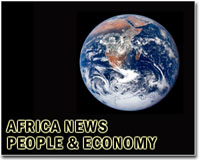| . |  |
. |
Juba, Sudan (UPI) Feb 14, 2011 South Sudan, soon to be the world's newest country, is grappling with mounting bloodshed triggered by renegade military commanders and rival forces deployed along the contested oil-rich border with the north. The violence, and the prospect of more to come, is a major setback for the government of the mainly Christian African south as it struggles to establish a viable state following a landslide 99 percent vote for independence from the Arab Muslim north in a historic January referendum. The northern regime of President Omar Hassan al-Bashir in Khartoum, itself plagued by growing unrest by pro-democracy protesters, has pledged to accept the southern secession. But traditional ethnic rivalries, ownership of oilfields that lie mainly in the south, and border demarcation remain as significant obstacles to maintaining a 2005 peace agreement that ended a 22-year civil war between north and south. The referendum was a key component of that Western-brokered pact. "Renewed civil war in Sudan would present an acute policy challenge to the United States in Africa," the Council on Foreign Relations warned before the vote on the referendum. That has a singular resonance in the wake of the recent downfall of two of the United States' dictatorial Arab allies, Hosni Mubarak of Egypt and Zine el-Abidine Ben Ali of Tunisia, in a wave of pro-democracy uprisings across the Middle East. "Although the United States has no significant strategic or economic interests at stake in Sudan other than the counte-rterrorism support that it reportedly receives from Khartoum, a major new outbreak of violence, with all its attendant humanitarian consequences, would put considerable pressure on the United States to respond and prevent further bloodshed," the CFR report cautioned. A key indicator of whether the north-south transition will be relatively peaceful is an agreement between Khartoum and the southern government in Juba, the new state's hardscrabble capital, on sharing oil revenues. Initial negotiations are understood to have begun but much of the violence that has flared before, during and after the Jan. 9-15 referendum, occurred in oil-bearing areas like the hotly disputed Abyei region, which straddles the border. A separate referendum had been planned for Abyei because of its particular importance but it was scrapped and its future remains unresolved. The area is split between the southern Dinka Ngok tribal confederation and the northern-backed Misseriya Arab cattle herders. If there's a flash point between the former civil war foes this is it. Forty people were killed there in clashes amid deadlock over the canceled referendum. The southern president, former rebel leader Salva Kiir, appealed to Abyei's people to be patient and cautioned, "There is no easy walk to freedom." Despite deep suspicions between north and south, one of Kiir's biggest problems is the deep-rooted, tribal-based divisions in the south that are causing much of the violence. During the civil war, more southerners were killed by internecine warfare than at the hands of Bashir's northern forces. Indeed, Khartoum often armed and funded tribal rivals in the south to undermine the secessionist rebellion, to fragment and weaken the rebel cause -- and it isn't beyond the bounds of possibility that these tactics may be still be in play. At least four southern commanders launched uprisings in 2010 and none has been completely crushed. One of them, "General" George Athor, took up arms against Kiir's Sudan People's Liberation Movement government in Juba after losing a bid to win election as governor of Jonglei state last April. His forces stormed the town of Fangak in Jonglei Feb. 3. In two days of fighting with Kiir's forces, the Sudan People's Liberation Army, 105 people were killed. The same day, another group of former rebels, nominally integrated into the northern army, mutinied in Upper Nile state, a major oil-producing center that borders Jonglei. Sixty people perished. Given the majority Dinka's domination of the impoverished and war-ravaged south, tribal politics are expected to determine the infant state's power centers. More mutinies and uprisings are likely. In the north, Bashir faces growing domestic opposition, in part for allowing the oil-rich south to secede. But he's also grappling with the wave of pro-democracy protests over economic and political grievances sweeping the Middle East. Bashir has responded by arresting prominent rivals, including a former ally, Islamist leader Hassan al-Turabi.
Share This Article With Planet Earth
Related Links Africa News - Resources, Health, Food
 Tunisian army patrols ports to stop migrant exodus
Tunisian army patrols ports to stop migrant exodusZarzis, Tunisia (AFP) Feb 14, 2011 Tunisian troops patrolled southern fishing ports Monday, controlling access and checking identities in a bid to halt a Europe-bound exodus of illegal immigrants that has alarmed Italy. Armoured vehicles moved through the town of Zarzis and blocked entry to the port where soldiers armed with Kalashnikovs and truncheons allowed only people identified as fishermen to enter, an AFP reporter said ... read more |
|
| The content herein, unless otherwise known to be public domain, are Copyright 1995-2010 - SpaceDaily. AFP and UPI Wire Stories are copyright Agence France-Presse and United Press International. ESA Portal Reports are copyright European Space Agency. All NASA sourced material is public domain. Additional copyrights may apply in whole or part to other bona fide parties. Advertising does not imply endorsement,agreement or approval of any opinions, statements or information provided by SpaceDaily on any Web page published or hosted by SpaceDaily. Privacy Statement |